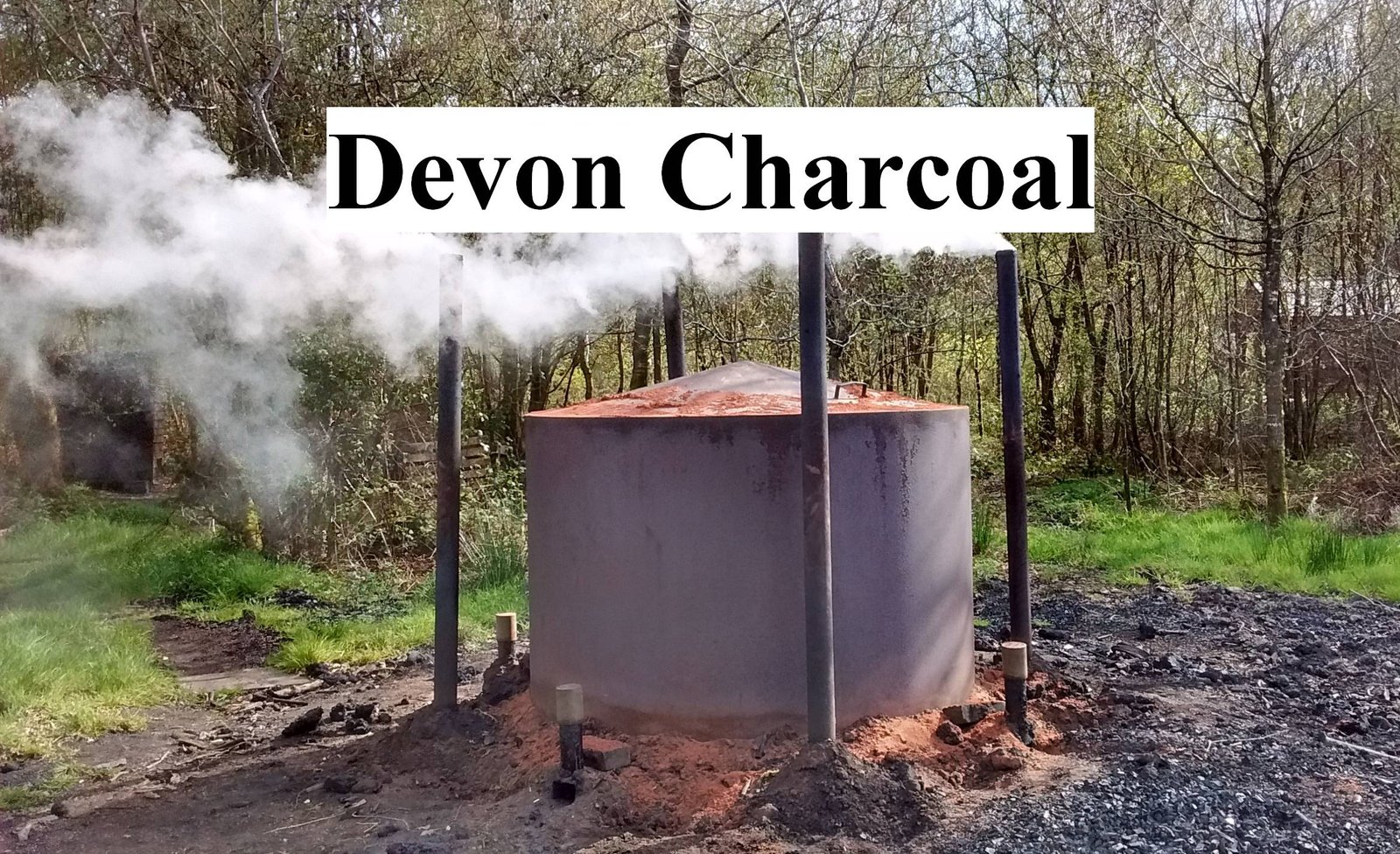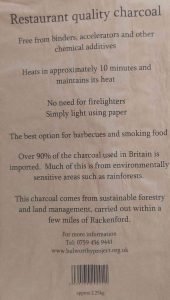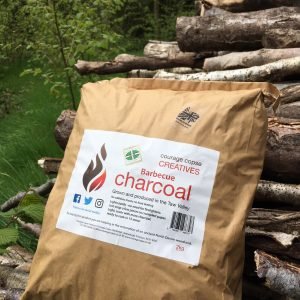Packaging
The first experience that a potential customer has of your charcoal is probably looking at the packaging. In order to make them become a customer and not just someone who saw your charcoal in a shop, there are a number of things that the packaging has to do. Firstly it must indicate clearly that it is charcoal and that it is suitable for barbecues.
The next thing for the packaging to do is to persuade them that this is the charcoal that they want to buy. If the packaging looks like it was designed with care and looks attractive, it gives an indication that you care about what is in it, which indicates that you have taken a certain level of care over the whole process. If you intend to sell your charcoal locally, having your location on it is probably a good plan so that people know how local it is. We have the Devon Wildlife Trust Approval Scheme stamp on ours, to show our sustainable credentials, other charcoal makers use the Grown in Britain stamp and other similar accreditation. A short phrase or two like “No chemical additives” can be good on the front of the bag, but it’s important not to clutter it. The more that the bag says, the less effective it is at making each statement.
When someone has picked the bag up and turned it over, you have the opportunity to tell them all of the reasons that they should buy your charcoal. You can explain your sustainable woodland management and the advantages for them of having no chemical additives. You can tell your story a bit on the back of the bag. It’s worth having your contact details and website there as well to encourage future sales.
Images
Most bags have some sort of logo or drawing. When designing this, it is easy to think about your experience of making charcoal rather than the connection that someone cooking on it has. Packaging with images symbolising the part that charcoal production plays in sustainable woodland management may play very well with those in the know, but it’s astounding how many people don’t even know that charcoal comes from wood. If you are using such images a short explanation such as: ”Produced from sustainably harvested wood”, might be a good idea. We have a tree on the front of our bags, but it’s the logo for our enterprise as a whole rather than exclusively for the charcoal. However, back when we designed our first bags, having not spent the hundreds of hours that we have since, thinking about charcoal packaging, we may well have put a tree on the bag even if it wasn’t our logo. It seems like an obvious choice to the charcoal maker.
Make Your Bag Distinctive
If you have a logo, display it boldly. Display your name boldly. Make your bags as distinctive and recognisable as possible. If you have made high quality hardwood charcoal and graded it properly, you don’t want people to just see it as generic charcoal, you want to develop brand recognition. You want people to know that when they open the bag, it won’t be full of softwood charcoal and dust, but will instead contain the high quality charcoal that they love to cook on. You want them to see your bag out of the corner of their eye and start thinking about delicious barbecues.
Bag Size
We package all of our charcoal into 2.25kg bags. This is sufficient for all but the largest domestic barbecues and small enough to easily carry. 4kg bags used to be common, but seem to have lost popularity. The smaller bag you sell it in, the more you can charge per kilo of charcoal and as it takes a lot of effort to turn a tree into charcoal, you want to maximise your profit per kilo. We did look at having 2 sizes of bag, but that would have meant an extra 5,000 bags to buy and store, which didn’t seem worthwhile. If we had a business based on selling to restaurants, we would have larger sacks for that purpose, which we probably wouldn’t have printed. This would save a lot on packaging costs. It could also make sense to have larger unprinted sacks to sell charcoal to barbecuing enthusiasts who buy a lot of charcoal and want to buy in bulk, allowing you to pass on the savings on packaging, giving them great charcoal at a low price.
Buying Packaging
We get our bags made by Wyatt and Ackerman. They’re not the cheapest and the minimum order is 5,000 bags, but the print quality is great and the one time they made a mistake on the print, they agreed that it was their mistake and reprinted the bags without quibbling.
We previously used a packaging company who are well known for making charcoal bags, but they sent us bags where the print was all over the place. They afterwards told us that there was a 15% tolerance on the print position both vertically and horizontally. It is worth asking the company where you get your bags printed if there is such a tolerance in advance. If there is, look at how the bag would look with the print out by this much and decide if you are happy with that.
Nettelfields use Simpac who have a lower minimum order. The bags look fine and there have been no issues.
If you are not happy to buy thousands of bags, you can buy plain bags and get labels made up as Courage Copse Creatives and The Woodland Farm have in the examples below. The Woodland Farm have used a kraft brown sticker, which blends in with the bag.
Marketing
Assuming that your charcoal is great quality, once people try it, they will come back for more. Almost all of our outlets increase their sales year on year for this reason. Of course, first you have to get them to try it. This generally involves getting it into shops.
Shops
There are a number of different options when it comes to outlets for charcoal:
A farm shop that sells meat is ideal. What better to cook high quality locally produced meat over, than high quality locally produced charcoal? Butchers are good as well. Anywhere that sells meat will do well out of selling charcoal. People completely forget about portion sizes when they have a barbecue and buy vastly more than necessary. Whilst this is environmentally questionable, butchers love it.
Campsites are good if they allow barbecuing. One campsite bought in rental barbecues so that people could use our charcoal rather than instant barbecues.
Garden Centres are good and we have a farm supply store that’s a very reliable outlet. Partly, this is because they’re set up for people buying bulky goods. We’ve found town centre outlets to be less good as people have to carry the charcoal to their car and although not that heavy, it is bulky. We’ve discussed whether handles on the bags would make a difference. Maybe they would.
Convenience stores can be good if they have enough space, especially if they’re in a touristy location. Space is an issue with charcoal as it’s a bulky product and has to be kept dry, so can’t be left outside. When we first approached small shops with our charcoal, we offered very low minimum orders for this reason and then raised it when they knew it would sell, at which point they’ll find somewhere to store and display it. Don’t be put off by franchises. Although a lot of the purchasing is done through a centralised system, the individual shops can order local goods in too. We used to sell our charcoal to a Spar and we now supply a Londis.
We’ve never sold our charcoal to a garage, but that’s more about nurturing a brand image than anything else. Garages sell loads of charcoal. That charcoal may as well be sustainable locally produced charcoal rather than the fuel soaked imported rubbish.
Finding Outlets
Our method of finding outlets was a combination of internet searches, personal recommendations and driving around looking for likely places. When we found somewhere that looked promising, we went in with a bag of charcoal and explained that we made this charcoal in our woods in Rackenford and were looking for outlets. As well as low minimum orders, we were happy to offer sale or return. Continuing with those terms would not be viable, but you need to get them hooked on your charcoal before you streamline it. We only have one outlet that is still on sale or return. That’s the community owned shop in our village which works in a slightly quirky way. Most shops want to pay up front once they know that the product will sell. It’s not worth the extra paperwork to delay the payment, but it does allow them try without any risk on their part.
Going into a shop to do cold sales with the product that is the culmination of years of plans and work and the basis of your future livelihood is somewhat nerve racking. Sometimes people laugh at you and tell you how cheap charcoal is in Lidl. However, others stroke the bag and say lovely things about the packaging and your ethos and then they buy the charcoal. They also go on to buy it regularly each summer.
If the person who makes purchasing decisions was not in or needed more time to think about it, we’d leave them a free bag of charcoal. This got us a number of outlets, some because they used the bag or a friend did and they found out how great the charcoal was, some because they displayed it and it sold. If you leave a business card it may well be lost or forgotten, a bag of charcoal acts as an oversized, hard to lose business card.
We didn’t approach any shops that were already selling locally made charcoal. Competing with other local charcoal makers doesn’t make any sense. It just results in bad feeling and a race to the bottom with prices. If all of the local charcoal makers are making good quality charcoal, then people locally will talk highly of locally produced charcoal. This helps everyone. There’s enough custom for everyone. We need to take market share from imported charcoal.
We used to sell our charcoal through two internet outlets and a distributer. These were great businesses to get us started, but we were never really comfortable with the charcoal miles. We’ve now developed a thriving local market for our charcoal, which means that we can sell it all through small businesses locally.
Restaurants
We’ve not sold a lot of charcoal to restaurants, mainly because we want our bags out on display to increase awareness of our brand. We have however, been approached by a lot of restaurants. They often say that they want immense quantities, but if they base their projections on their existing use of imported charcoal, you can halve the quantity because British charcoal goes a lot further. If they are just opening the establishment, they may be basing their projections on wishful thinking. It’s more convenient for them and you if they take it in large, plain sacks. This way you can give them a small discount on price. There’s no point selling the charcoal too cheap, because you can sell it anyway and keep in mind that food in a restaurant has added value if cooked over high quality charcoal.
Social Media
It would be somewhat remiss to talk about marketing in the 21st century and not mention social media, but it is a whole subject in its own right, so we’ll just express a few thoughts about the way that we see it being useful for marketing charcoal. Although controlled by some of the largest corporations in the world, social media provides great opportunities for small businesses to get their message out, particularly if you are up for cooperating with other small businesses. If you put out a post about how proud you are to be selling your charcoal at a certain farm shop due to the quality of the meat they supply, they will probably share it and may add a comment about how good your charcoal is. Their followers see your charcoal, your followers see their shop and you cement the relationship between your businesses. Because social media is most effective when it is most interactive, the more you can get people to comment the better. Therefore, tactics like asking your customers for pictures of the barbecues or recipe ideas can increase the effectiveness of a post. You could even turn it into a competition, where the best recipe or the craziest place that someone has a barbecue wins a prize. Providing recipe ideas yourself can be a good idea too. If your charcoal is high quality, you will soon have people on social media telling you and the world that that is the case. This is of course, old fashioned word-of-mouth advertising, just with a greater reach.
A Positive Environment for Selling Charcoal
The three main reasons people say that they buy our charcoal are: quality, locally produced and environmentally sustainable, in that order. All three of these attributes have become more important in people’s minds in the time that we have been making charcoal.
Dirty Steaks Require Clean Charcoal
Barbecuing is not what it was at the end of the 20th century. No longer are people just burning a few sausages and half cooking chicken on a barbecue they bought from B&Q for £25. There has been a massive rise in the popularity of the high end barbecue. Often these are ceramic and require pure lumpwood charcoal. Where you might get away with scorching a few sausages over dodgy charcoal without noticing an effect, when you cook a joint low and slow in a barbecue it sits in the fumes of the charcoal for many hours. You don’t want paraffin flavoured pulled pork. If you do “dirty steaks” where the steak goes directly into the embers, you want clean charcoal. People who are serious about barbecuing don’t mind paying a bit more for high quality, additive free charcoal.
Buying Local
Local produce is a much more important factor in people’s thinking than it ever used to be. We started selling charcoal just after the economic crash. At that point, locally produced became a bigger selling point for food than organic. Partly this is about environmental sustainability, partly it’s about the local economy and economic sustainability and partly it’s about people losing trust in a globalised economy. We promoted our charcoal partly on this basis and more and more we have seen this coming up in comments that people make about why they buy our charcoal.
Environmentally Sustainable
The western world has become much more conscious about the environment and ethical consumerism is much more in people’s psyche than it used to be. The difference in the environmental credentials of different types of charcoal are stark, and when people try the ethical option it’s better to use, which makes it an easy change to make. We need to explain to the population in general what these environmental differences are in order to use this to our best advantage.
Sales
If you are a barbecuing enthusiast, it makes sense to go to the woods to buy your charcoal, buy at least 10 bags and get wholesale price. To the charcoal maker, this means no delivery costs and your customer has a story about the charcoal to tell at barbecues, thereby advertising it to their friends.
We deliver to various local outlets. As with any aspect of running a business, you need to make your deliveries as efficient as possible. We have 2 delivery runs for our charcoal. The main run is up to the North Devon coast with deliveries between there and our woods. We do this delivery run every fortnight from the beginning of April. We have tried to make the route as practical as possible. We email all of the outlets on this route at the beginning of the season to let them know our delivery dates for the year. We then email again a week before each delivery. This avoids having to do ad hoc deliveries or outlets running out. When we’re doing this delivery run, we also do our weekly shop in Barnstaple to make the most of the journey. Our other route is the delivery to all of the outlets around Tiverton where we do our shopping when we’re not doing our North Devon run. Outlets on this route contact us when they need charcoal and we drop it off next time we’re passing. By co-operating with other local charcoal makers, we can divide outlets into workable routes, making efficiency savings for us all.







